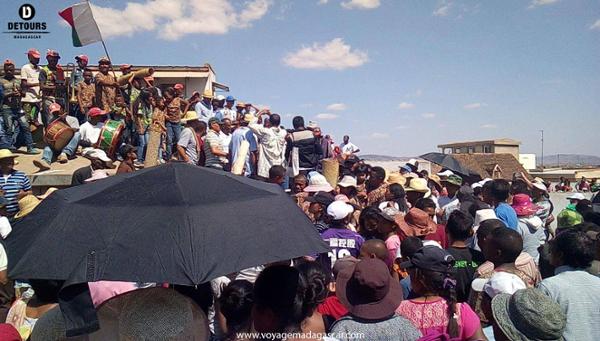
Famadihana: The turning of the bones
Famadihana is a tradition often mistaken for simple exhumation, but it is far more than that. Travelers may draw comparisons to *Ma’nene*, a ritual practiced on the Indonesian island of Sulawesi, where the dead are exhumed, cleaned, and dressed. However, famadihana is a unique tradition found only in Madagascar. What are its origins? What does it involve? What is its purpose? Let’s find out.
Entering the family tomb, entering heaven
During King Andrianampoinimerina’s unification campaign of the Malagasy kingdoms (1745–1810), many Merina soldiers died far from home. For the king, it was a tragic fate to be buried away from one’s homeland. He proposed the construction of family tombs and ordered the repatriation of remains so the deceased could rest with their relatives. According to Malagasy beliefs, this was equivalent to entering heaven.
Famadihana became a widespread tradition around 1814, during the reign of Radama I (1793–1828), Andrianampoinimerina’s son. The practice originated in Imerina and was later adopted by other ethnic groups within the unified kingdom. The ceremony is held every 3, 5, or 7 years, with the date determined by the family’s mpanandro—a soothsayer, shaman, and traditional healer. It always takes place during the dry season (June to September).
However, some Christian communities have abandoned this tradition due to its association with divination and ancestor worship. Nevertheless, famadihana remains a vital part of Malagasy culture and identity, and efforts should be made to preserve it, even with some modifications to reconcile it with modern beliefs.

From grief to joy
The term famadihana translates to "turning" or "transformation." One of the main goals of this tradition is to "transform" grief (mourning) into joy. While funerals are somber, famadihana is a jubilant celebration.
It is a grand event, especially for wealthier families who may spend significant amounts of money. The ceremony spans two days. On the first day (andro fidirana), zebus are slaughtered for the feast, food preparation begins, and music and festivities kick off. On the second day (famokarana), family members and guests gather for a communal meal, followed by dancing. The celebration involves not just food but also abundant alcohol consumption.
From conflict to Fihavanana (Harmony and Love)
Later in the afternoon, a man carrying a flag (and often blowing a whistle) leads the procession to the family tomb. Along the way, people dance and play music, traditionally using flutes, drums, and trumpets. The atmosphere is joyous, and the event is an opportunity to bury grudges—particularly for the hosting family, the tomb’s custodians.
Family members are "required" to forgive one another, especially siblings. Disputes are left behind—at least until new ones arise, as is the way of life.

Unifying the family
The Malagasy proverb "Velona iray trano, maty iray fasana" ("United in life, united in death") takes on profound meaning during famadihana. A single tomb often holds the remains of multiple families connected by a common ancestor.
Famadihana is also a time to unify the dead, especially spouses. Husbands and wives are wrapped together in lamba (white cloth). Depending on the family’s decision, other relatives may also be wrapped together.
At the tomb, its doors are opened, and family members enter to retrieve the remains. The bodies are handed to their closest relatives, typically children, who form small groups to wrap the deceased in fresh cloth. Once finished, they hold the bodies on their laps. Music continues throughout the entire process.
When everyone is ready, the bodies are lifted onto shoulders, and the participants dance exuberantly. Grief is transformed into joy. The remains are returned to the tomb in order of seniority, and the ceremony concludes with a speech of gratitude.